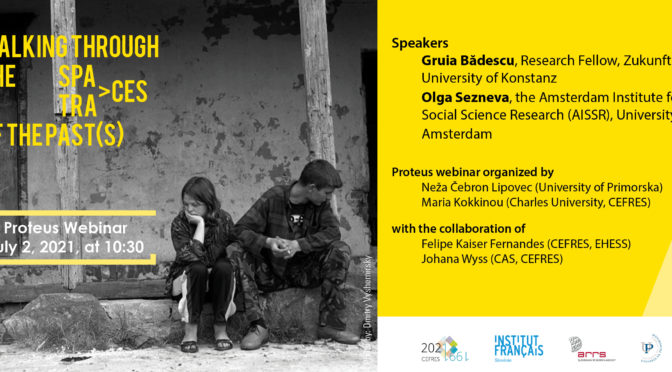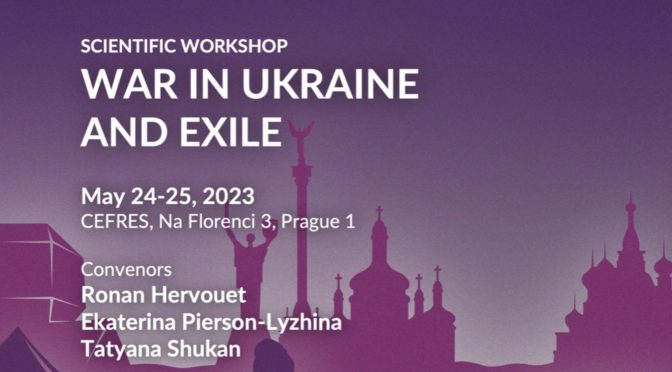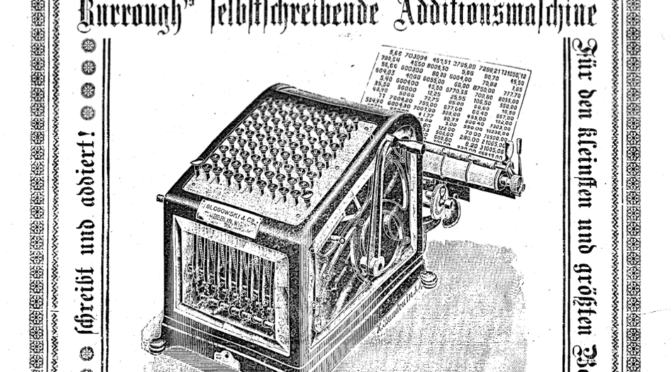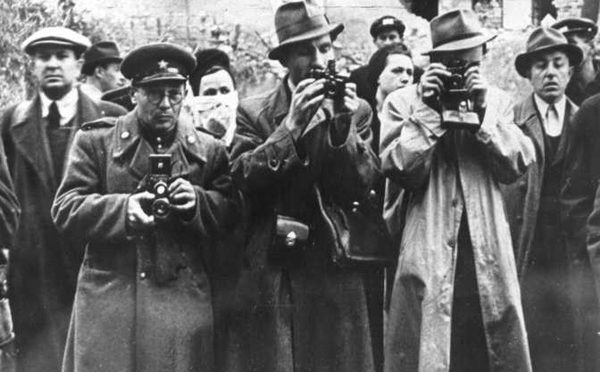
CEFRES and Primorska University organize the second Proteus Webinar as part of the bilateral program PHC Proteus.
When: July 2nd, 2021, at 10:30 am
Where: Online
Connection link: https://us02web.zoom.us/j/85960136043
Language: English
Organizers:
Neža Čebron Lipovec, University of Primorska and
Maria Kokkinou, Charles University / CEFRES
Funding and Evaluation: Campus France, French Institute in Slovenia, MEAE, MESRI (France) Slovenian Research Agency, Slovenian ministry of science (Slovenia)
Speakers:
Gruia Bădescu, Research Fellow, Zukunftskolleg,
University of Konstanz
Olga Sezneva, the Amsterdam Institute for Social
Science Research (AISSR), University of Amsterdam
with the collaboration of:
Felipe Kaiser Fernandes (CEFRES / EHESS) and
Johana Wyss (CAS / CEFRES)

The scientific workshop “War in Ukraine and exile” will bring together European researchers to present the preliminary results of their interviews and observations conducted after 24 February 2022 among exiles from three countries: Ukraine, Belarus, and Russia. The presentations of papers will address the following themes: trajectories of exiles (mobilised networks, successive displacements), exile experiences (emotions, intimacy), forms of politicisation (ordinary and institutional), interactions between different exiled communities, relations between exiles and host societies/states, relations with relatives left at home, representations and imaginaries associated with the war and its consequences. The workshop is organised in the framework of the BIELEXIL research project. The latter is financed by the flash grant dedicated to Ukraine from the French Collaborative Institute on Migration (Institut Convergences Migrations, ICM).
Continue reading War in Ukraine and exile →

3rd session of CEFRES Seminar 2021-2022
What Did the Typewriter Do to Banking?
Bureaucratic Practices, Materiality, and the Logic of Capitalism in the Late Habsburg Monarchy
Hosted by:
Mátyás Erdélyi, post-doctoral fellow at CEFRES and Charles University
When: November 3rd, 2021 at 4:30 pm
Where: CEFRES and online (to register please mail to claire(@)cefres.cz)
Language: English
Abstract
In this talk, I present my current research project that focuses on bureaucratic practices in banking at the turn of the century from the perspective of the materiality of office work. The project reconstructs the emergence of the modern bureau by relating the “grubby details” of office work to the multi-faceted identity of functionaires. Based on the case study of several savings banks in the Dual Monarchy, it studies how the logic of capitalism materialized and was embodied in different forms, how bureaucratic practices were implanted in the body and hands of clerks, and what exactly clerks did and they did it with what?

 Annette Wieviorka is probably one of the famous French historians on the Holocaust and a specialist of the history of Jews in France. A distinguished researcher of French National Research Center (CNRS), she just published 1945, la découverte (Le Seuil, 2017), dealing with the discovery of the Nazi concentration camps in April and May 1945 by the Allies through the testimonies of two war reporters. Among her books translated into English, one will read her groundbreaking The Era of the Witness (Cornell, 2006), along with Auschwitz Explained to My Child (Marlowe & Co, 2002). She talks about her personal trajectory in a series of interviews conducted by Séverine Nikel published in French under the title L’heure d’exactitude (2011). Annette Wieviorka will give her insight on the figure of the witness at the time of WWII during her lecture in Prague.
Annette Wieviorka is probably one of the famous French historians on the Holocaust and a specialist of the history of Jews in France. A distinguished researcher of French National Research Center (CNRS), she just published 1945, la découverte (Le Seuil, 2017), dealing with the discovery of the Nazi concentration camps in April and May 1945 by the Allies through the testimonies of two war reporters. Among her books translated into English, one will read her groundbreaking The Era of the Witness (Cornell, 2006), along with Auschwitz Explained to My Child (Marlowe & Co, 2002). She talks about her personal trajectory in a series of interviews conducted by Séverine Nikel published in French under the title L’heure d’exactitude (2011). Annette Wieviorka will give her insight on the figure of the witness at the time of WWII during her lecture in Prague.
Find out more about Annette Wieviorka here.
Venue: Faculty of Arts of the Charles University, Nám. J. Palacha, room 200
Horaires : 5:30-7:30
Organizers: Kateřina Čapková, Clara Royer and Milan Žonca
Partners: CEFRES, Prague Center for Jewish Studies (FF UK) and the Institute of Contemporary History of the Czech Academy of Sciences. With the support of the French Institute of Prague
Language: French with simultaneous translation in Czech
Illustration: “Taking photos of the victims in the ghetto (Budapest, 19. January 1945)”. Source: http://phdn.org/archives/holocaust-history.org/hungarian-photos/

International Workshop
Organizers: Benedetta Zaccarello (CEFRES) & Kannan Muthukrishnan (French Institute in Pondicherry)
Partners: CEFRES & French Institute in Pondicherry
Where: French Institute in Pondicherry, India
When: 7 & 8 March 2019 Language: English
Programme
March 7th, 2019
9:30 AM Opening remarks
Prof. Frédéric Landy, director, IFP
Session 1: Methodological, historical and theoretical standpoints
- Dr. Benedetta Zaccarello, CEFRES (CNRS-MEAE, Prague) and Mr. Kannan M. (IFP), introductory remarks
11 AM Coffee break
11:15 AM
- Dr. Jayanta Sengupta (secretary and curator at Victoria Memorial, Kolkata), on the intercultural issues related to archival practices
- Prof. Subbarayalu (IFP), on archives and inscriptions: an historical overview
1 PM Lunch
2 PM
Living memories: past and present of some Indian archives
- Mr. Peter Heehs (historian, former archiviste, Sri Aurobindo Ashram Archives), on the history of Sri Aurobindo’s Archives
- Mr. Rengaiyah Murugan (Librarian, MIDS, Chennai), on Tamil manuscripts and archives
- Dr. Roland Wittje (IIT, Chennai), collections and archives: history of science and technology
4 PM Coffee break
4:15 PM
- Dr. Anupama K. (IFP), on interrelated collections at the Ecology Department of IFP
- Mr. Venkat Srinivasan (Archiviste, IIS, Bangalore), on the digital representation of the archives at the Indian Institute of Science, Bangalore
Visit of the IFP collections (palm leaf manuscripts with Dr. Devi Prasad, collections of photographs with Mr. Ramesh Kumar and collections of Ecology with Dr. Anupama K.)
7.30 PM Dinner at IFP
March 8th, 2019
Session 2: Archives beyond borders and mindsets
Archives: trans-cultures and post colonialisms
9:30 AM
- Prof. Albert Dichy, IMEC, Caen, France, head of literary collections
- Dr. Chandramohan (Curator, GOML, Chennai), on the colonial period and the palm leaf and paper manuscripts from the “McKenzie” collection
11 AM Coffee break
11:30 AM
- Mr. Richard Hartz (Researcher, Sri Aurobindo Ashram Archives), on the intercultural aspects of Sri Aurobindo’s manuscripts
- Dr. G. Sundar (Director, Roja Muthaiah Research Library, Chennai), on archiving 20th century Tamil
1 PM Lunch
2 PM
Oral traditions and visual heritage in the age of digital archives
- Dr. C.S Lakshmi (director, SPARROW, Sound and Picture Archives for Research on Women, Mumbai), on archiving women’s testimonies and archives of orality
- Mr. Prashant Parvatneni (Kabir Project, Bangalore), on building the “Kabir Project” Archive
- Ms. Ranjani and Mr. Faizal (Keystone Foundation), on the creation of the Keystone Foundation Resource Centre, Nilgiris
4 PM Coffee break
4:15 PM
- Dr. Alexandra De Heering (IFP), on accessibility to visual archives
- Mr. Gopinath Sricandane (IFP), on the visual medium of archives
- Dr. Pierre Triomphe (Institut National du Patrimoine, Paris), on heritage and archives
5:30 PM Roundtable discussion
A lecture by Marcin Wodziński (Wroclaw University) in the frame of the seminar on Modern Jewish History of the Institute of Contemporary History (AV ČR) and CEFRES in partnership with the Masaryk Institute (AV ČR).
Where: CEFRES library, Na Florenci 3, 110 00 Prague 1
When: from 5:30 pm to 7 pm
Language: English
Abstract
What is Hasidism? Why do we know so little about one of the most intensively- researched phenomena in Jewish history? Which historiographical presumptions hinder the development of our knowledge about Hasidism? How is it related to the basis of sources and methodological approaches? What would Hasidism look like if approached from a different, anti-elitist perspective, from a provincial shtibl and not a tsadik’s court?
These questions will build the core of the talk by Professor Wodziński, key expert on Hasidism, author of Hasidism. Key Questions (Oxford University Press, 2018) and editor of the Historical Atlas of Hasidism (Princeton University Press, 2017).






